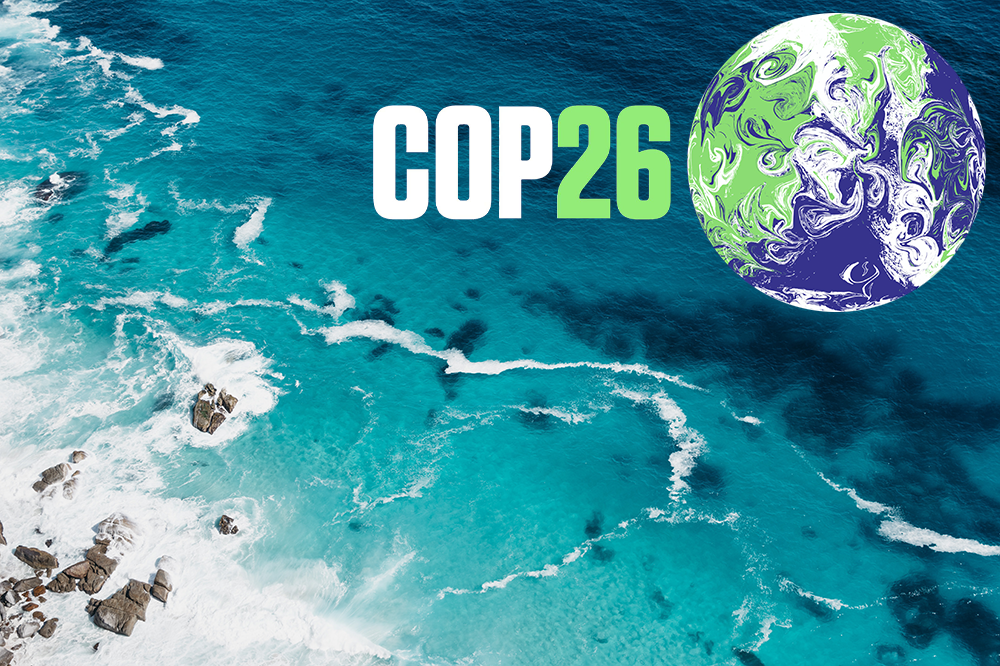Story
What next for the ocean? PML welcomes incorporation of the ocean into COP26 Glasgow Climate Pact
19 November 2021
Following more than a decade of hard work by many parties and stakeholders, including Plymouth Marine Laboratory (PML), the ocean was incorporated into the text of the multilateral UN climate change outcome document at the close of the recent COP26 summit in Glasgow.

Heralded as marking a step-change for the ocean the COP26 ‘Glasgow Climate Pact’ notes ‘the importance of ensuring the integrity of all ecosystems, including in forests, the ocean and the cryosphere, and the protection of biodiversity’. Of great significance is that the Pact mentions that ‘the relevant work programmes and constituted bodies under the United Nations Framework Convention on Climate Change (UNFCCC) to consider how to integrate and strengthen ocean-based action in their existing mandates and workplans and to report on these activities within the existing reporting processes, as appropriate’.
In addition, the Chair of the Subsidiary Body for Scientific and Technological Advice (SBSTA) was invited to hold an annual dialogue (starting June 2022) "to strengthen ocean-based action and to prepare an informal summary report thereon and make it available to the Conference of the Parties (COP) at its subsequent session”. This follows the informal summary report of the COP25-mandated 'Ocean and Climate Dialogue to consider how to strengthen adaptation and mitigation action' welcomed by the Pact and to which PML provided input.
Scientists from Plymouth Marine Laboratory (PML) have been involved with reporting the latest scientific evidence and assessments on climate change to the UNFCCC since 2006, initially co-authoring policy briefs and other documents (on ocean acidification in 2006), making contributions to the UNFCCC’s Subsidiary Body for Scientific and Technological Advice (SBSTA) and acting in Lead Author roles with the Intergovernmental Panel on Climate Change (IPCC) reports (from 2007 onwards).
PML has also attended every UNFCCC COP (Conference of Parties) since 2009 to help bring evidence of the latest ocean climate science to key stakeholders. At COP26 PML was involved with over 25 events, several exhibits and a number of publications.
At this year’s event, the first ever Ocean Pavilion at a COP was created to showcase why the ocean matters in climate negotiations. Featuring an overview of the ocean events at the COP26 itself as well as hosting live events with more than 60 international speakers, exhibition booths, a treasure trove and more. The Ocean Pavilion which saw close to 3,000 registrations was founded and coordinated by PML alongside the Global Ocean Forum, Ocean Policy Research Institute (OPRI) of the Sasakawa Peace Foundation, the Oceano Azul Foundation, and the Intergovernmental Oceanographic Commission (IOC) of UNESCO, in collaboration with many other partners from across the globe. This virtual pavilion will remain open until December 12 and can be accessed here: https://cop26oceanpavilion.vfairs.com/.
Plymouth Marine Laboratory’s Chief Executive Professor Icarus Allen said, “While there is clearly a long way to go to achieve much-needed global action to mitigate, and indeed, reverse the impacts of climate change, the increased focus on the role of the ocean and the challenges it faces is very welcome. I am extremely proud of the role PML has played at this year’s COP and the work we have undertaken previously to raise issues such as emissions-related ocean acidification, warming, deoxygenation and sea level rise to the fore.”
Dr Carol Turley, Senior Scientist and PML’s Head of the International Office - who has contributed to a number of United Nations events and reports - added, “It is encouraging to see the ocean being recognised in this way as part of a more holistic and integrated part of UNFCCC processes. I can only imagine the enormous collective effort of numerous Parties and policy-makers in achieving this breakthrough text in the COP26 outcome document. I am also delighted with the positive response to the first ever Ocean Pavilion at COP26, with PML as a founding partner. We will continue to work alongside our many national and international partners, organisations, academics, businesses and politicians to further raise the scientific evidence behind the ocean-climate nexus and its importance to climate change policy.”